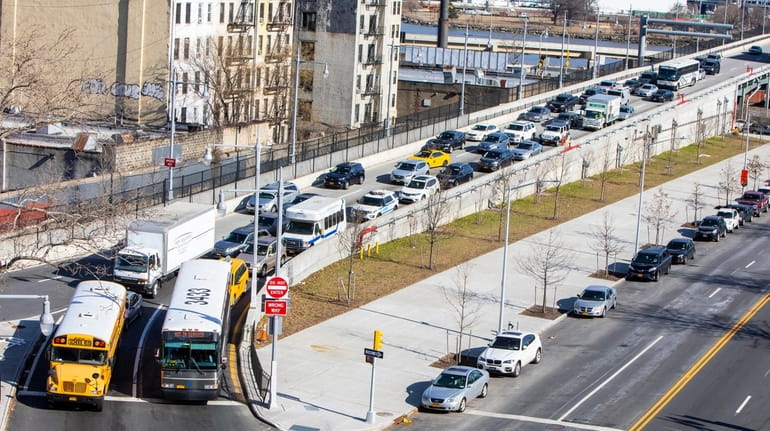LI Senate Dems oppose Cuomo-de Blasio congestion pricing plan

Another concern was that drivers who travel to Manhattan via the RFK Bridge, off-ramp shown above, would "pay a double toll" for crossing the bridge and for entering the congestion pricing zone. Credit: Marisol Diaz-Gordon
The Long Island Senate Democratic delegation said Wednesday it cannot support a congestion pricing plan as currently crafted by Gov. Andrew M. Cuomo and New York Mayor Bill de Blasio.
The six-member delegation cited “troubling concerns” with the proposal the governor and mayor unveiled a day earlier. They said they support congestion pricing conceptually, but that the plan must be changed because it:
- Channels funding “heavily, if not exclusively” to the subway system at the expense of the Long Island Rail Road. They said any congestion pricing plan must dedicate some funding to LIRR infrastructure.
- Fails to exempt drivers who travel to Manhattan via the RFK Bridge, meaning those drivers would “pay a double toll”: for crossing the bridge and entering the congestion pricing zone.
- Fails to include rider representatives from Long Island and New York’s northern suburbs on the Capital Review Committee, which would review infrastructure proposals.
The letter was signed by State Sens. John Brooks (D-Seaford), Jim Gaughran (D-Huntington), Anna Kaplan (D-Great Neck), Todd Kaminsky (D-Long Beach), Monica Martinez (D-Brentwood) and Kevin Thomas (D-Levittown).
"We cannot support the proposal in its current state and are happy to meet with any party to address these concerns. We remain ready to help craft a formula that Long Island commuters will find advantageous," the senators said in the statement. They added they were "generally supportive" of reducing Manhattan traffic congestion.
Democrats pointed out that the plan specifies that funding from the new tolls would be placed in a “lockbox” for the MTA, but adds “with priority given to the subway system” and other transportation initiatives within New York City — as opposed to the LIRR or Metro North systems.
Cuomo spokesman Rich Azzopardi, in response, said: “If the Long Island senators want representation on the Capital Committee, they should tell their leader, Sen. [Andrea] Stewart-Cousins, to appoint a Long Islander as her representative to the Capital Committee. Also, since our congestion pricing plan doesn’t set funding levels for the subways vs. commuter rails, we have no idea what they are talking about.”
Cuomo and de Blasio have united on a plan to impose tolls for drivers who enter Manhattan south of 61st Street as one way of generating revenue for the crumbling subway system. Cuomo said that without congestion pricing, the Metropolitan Transportation Authority would have to impose up to a 30 percent mass transit fare hike to help keep the agency going.
The Cuomo-de Blasio plan would require approval from the State Senate and Assembly, which are both controlled by Democrats. It could be included as part of the state budget, which is due April 1. De Blasio previously opposed congestion pricing to reduce traffic in New York City, preferring a tax on millionaires to help fund the Metropolitan Transportation Authority.
Analysts have said congestion pricing alone can't pay for all the needed MTA upgrades. Even Cuomo indicated fares might rise anyway, though he has said the amount would be tied to the MTA capital plan.
Further, the plan calls for the LIRR to consolidate common functions, including construction management, legal services, engineering, purchasing, human resources and advertising with the New York City Transit Authority, Metro-North Railroad, MTA Capital Construction, MTA Bus and the Staten Island Railway. Officials said the restructuring is intended to make the centralized agencies more streamlined and cost-efficient and could be completed by June.
Speaking with reporters later Wednesday, Senate Majority Leader Stewart-Cousins (D-Yonkers) said Democrats want to make sure any congestion pricing plan "benefits all regions" served by the MTA, which includes the Island and the Hudson Valley. She emphasized they don't oppose congestion pricing outright.
"Certainly, my conference is largely supportive of congestion pricing," she said. "But the reality is, there are issues. There are questions. And we're going to fight to make sure those concerns are addressed."
